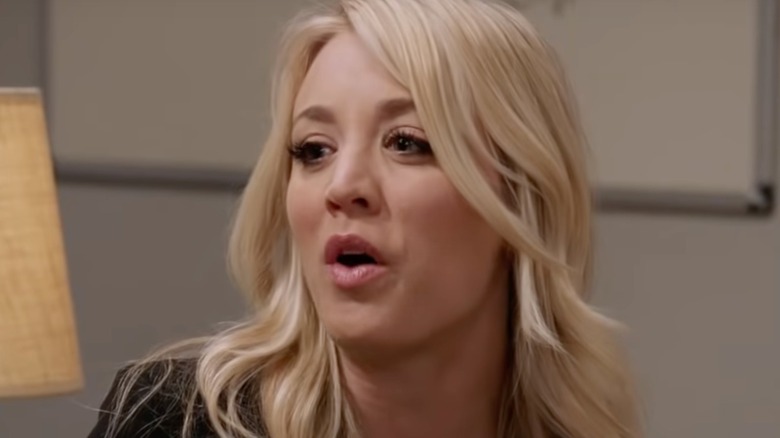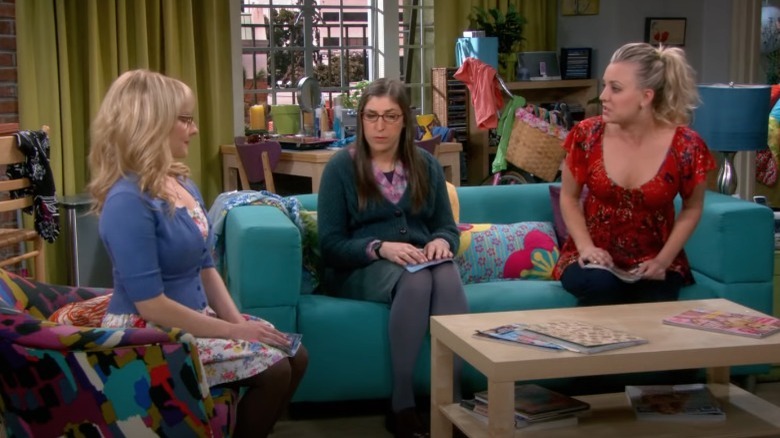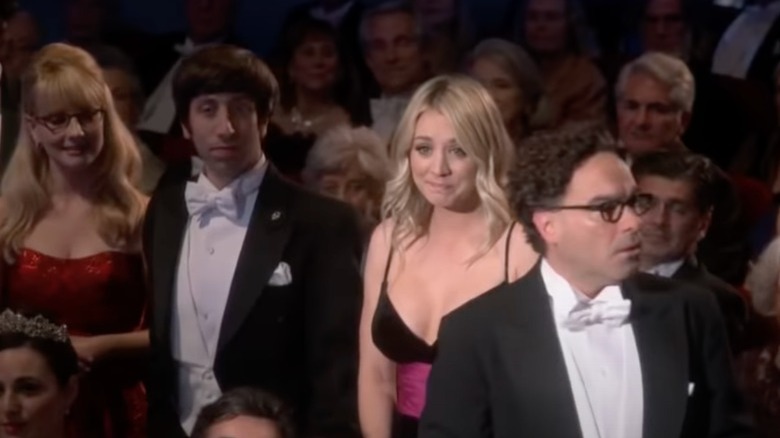Kaley Cuoco Says The Central Theme Of The Big Bang Theory Is Understanding
"The Big Bang Theory" was a fixture on the CBS schedule for 12 seasons. Over that time, it covered many topics and themes, from the love of geek-related fandoms to social awkwardness in characters with nerdy qualities, all done in a familiar, standard sitcom setting that many found comforting. When it went off the air in 2019, The Washington Post explained part of its appeal, writing, "It was the sweet sound of redundance and comfort — the rhythms of its wry jabs and retorts, the palatably odd mix of predictability and cerebral banter."
Although the half-hour comedy series has received its share of criticism for doing a disservice to nerds, women, people of color, and society in general, others defend it to this day. The Verge, for example, said the show turned nerds into "the new normal," predicting, "'Nerd culture' in general — however one chooses to define it — may look back one day and realize that this much-maligned, cartoony little sitcom was more of a positive force than they thought." Physics Today even said that the characterization of the scientists at the heart of the show helped them "express resilience, persistence, and likability."
At least one of the stars of the show would agree that "The Big Bang Theory," despite showing what non-viewers might consider stereotypical characters, may be a more positive influence. In the retrospective special on the series that aired after the show's finale, Kaley Cuoco explained why.
Cuoco points to an episode in which the women argue about comic books as an example
During "Unraveling the Mystery: A Big Bang Farewell," Kaley Cuoco reminisces about scenes her character Penny has with Bernadette (Melissa Rauch) and Amy (Mayim Bialik) have together. She recalls one in particular, which she and the other women are reading comic books. Apparently, co-star Johnny Galecki doesn't remember the episode very well — which makes sense, since the main characters' groups were split by gender in season 6's "The Bakersfield Expedition." Galecki asks, "Why was that?" And Cuoco replies, "We were trying to understand you guys, which is the theme of the whole show."
In the episode, "the guys" go off to the Bakersfield Comic-Con dressed as characters from "Star Trek: The Next Generation." Their girlfriends stay behind and get the brilliant idea to read comic books in an attempt to understand why the guys like them so much. After hitting the comic book shop, Penny picks up one featuring Thor because he's hot. Back at Penny's place, they finally finish reading and decide that the comics are stupid. Bernadette says, "It's crazy, they spend hours arguing over things that don't even exist."
That doesn't stop them from getting into a heated (and hilarious) debate over the nature of Thor's hammer, though. It leads the women to reread the comic and then into Leonard (Galecki) and Sheldon's (Jim Parsons) apartment for more comics so they can settle the debate. By the time the men return, they're wondering if they've gone into an alternate universe.
There's evidence that she's right, if you look at other favorite episodes
Kaley Cuoco is definitely on to something. After all, you could argue that some of the top-rated episodes of "The Big Bang Theory" also have to do with understanding. For example, the Season 3 episode "The Staircase Implementation," which reveals how Leonard and Sheldon became roommates, is an exercise in understanding — especially when Sheldon's smarts and his quick thinking lead to saving his friend's lives, in an event that also explains why the elevator to the apartment building is broken.
In another favorite episode from Season 9, "The Opening Night Excitation," the guys have to convince Sheldon that he needs to spend time with Amy on her birthday — and he comes up with first-time sex as a potential gift, because he knows it's something she wants and he values his relationship with her. And "The Bath Item Gift Hypothesis," a favorite episode of fans and actors like Cuoco, shows that, after two seasons, she already understands who Sheldon is and is able to give him the best holiday present he's ever gotten (although she slightly misjudges why he is so excited about the napkin with both Leonard Nimoy's autograph and his DNA).
The show even ends on an emotional note that evokes this theme. In the final episode, "The Stockholm Syndrome." Sheldon gives a touching speech when he wins the Nobel Prize, shouting out his friends for the way they "encouraged, sustained, inspired, and tolerated" him over the years.


